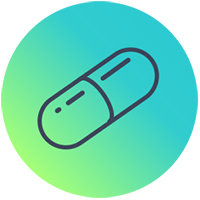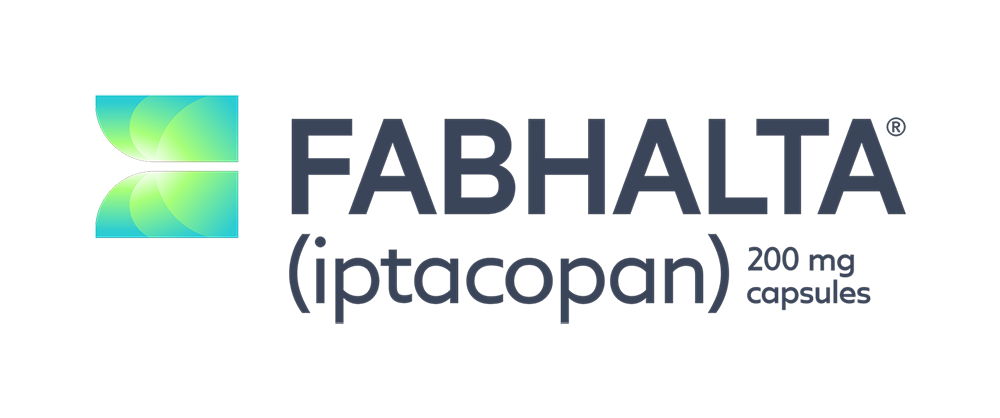
Vaccinations needed before starting FABHALTA
What is the most important information I should know about FABHALTA?
FABHALTA affects part of your immune system and may lower your ability to fight infections.
Certain vaccinations help protect you from serious infections while you are taking FABHALTA.
FABHALTA increases your chance of getting serious infections caused by encapsulated bacteria, including Streptococcus pneumoniae (pneumonia), Neisseria meningitidis (meningitis), and Haemophilus influenzae type b. These serious infections may quickly become life-threatening or fatal if not recognized and treated early.
If you have been vaccinated against these bacteria in the past, you might need additional vaccinations before starting FABHALTA. Your health care provider will decide if you need additional vaccinations.
Vaccines do not prevent all infections caused by encapsulated bacteria.
If you have not completed your required vaccinations, you have 2 options
Option 1
If you have not completed or updated your vaccinations before starting FABHALTA:
- Complete or update your required vaccinations
- Wait at least 2 weeks
- Begin treatment with FABHALTA
Option 2
If FABHALTA needs to be started right away, but you haven’t completed your vaccinations, you should:
- Begin treatment with FABHALTA and antibiotics. You will take these antibiotics for as long as your health care provider tells you
- Continue to complete or update required vaccinations as soon as possible
Take FABHALTA exactly as your doctor tells you.
While taking FABHALTA, you should be revaccinated according to current medical guidelines for encapsulated bacteria. Contact your health care provider regarding vaccination support. For eligible patients, Novartis Patient Support can help schedule in-home administration appointments, find local vaccination locations, and offer guidance on accessing existing vaccination records.
The most common side effects of FABHALTA in adults include: headache; nasal congestion, runny nose, cough, sneezing, and sore throat (nasopharyngitis); diarrhea; pain in the stomach (abdomen); infections (bacterial and viral); nausea; rash.
Tell your health care provider about any side effect that bothers you or that does not go away. These are not all of the possible side effects of FABHALTA.
Call your health care provider for medical advice about side effects. You may report side effects to FDA at 1-800-FDA-1088.
The FABHALTA Patient Safety Card
Your health care provider will give you a Patient Safety Card about the risk of serious infections. Carry this card with you at all times during treatment and for 2 weeks after your last dose of FABHALTA. Your risk of serious infections may continue for a few weeks after your last dose of FABHALTA. It is important to show this card to any health care provider who treats you. This will help them diagnose and treat you quickly.
If you notice any signs or symptoms described on this card, contact your doctor or get emergency medical assistance immediately.
DID YOU KNOW? REMS programs are used for a number of drugs and are meant to protect your health.
FABHALTA dosing information

Take FABHALTA at home or on the go
One capsule, twice a day, every day
With or without food
Swallow the capsules whole. Do not open, break, or chew capsules
You do not need to refrigerate FABHALTA*

If you miss your FABHALTA dose or doses:
As soon as you remember, take one dose of FABHALTA, even if it is almost time to take your next scheduled dose
Then take your next dose of FABHALTA at your regularly scheduled time
Take FABHALTA exactly as your doctor tells you. Do not change the dose or stop taking FABHALTA unless your doctor tells you.
What you need to know about switching to FABHALTA
For people switching from ULTOMIRIS®: start taking FABHALTA no later than 6 weeks after the last dose
For people switching from SOLIRIS®: start taking FABHALTA no later than 1 week after the last dose
If you stop taking FABHALTA
Your health care provider will need to monitor you closely for at least 2 weeks after stopping FABHALTA
Stopping treatment with FABHALTA may cause a breakdown of red blood cells due to PNH
Symptoms or problems that can happen due to breakdown of red blood cells include:
Decreased hemoglobin level in your blood
Blood in your urine
Shortness of breath
Trouble swallowing
Tiredness
Pain in the stomach (abdomen)
Blood clots, stroke, and heart attack
Erectile dysfunction
It is important you take FABHALTA exactly as your health care provider tells you to lower the possibility of breakdown of red blood cells due to PNH
